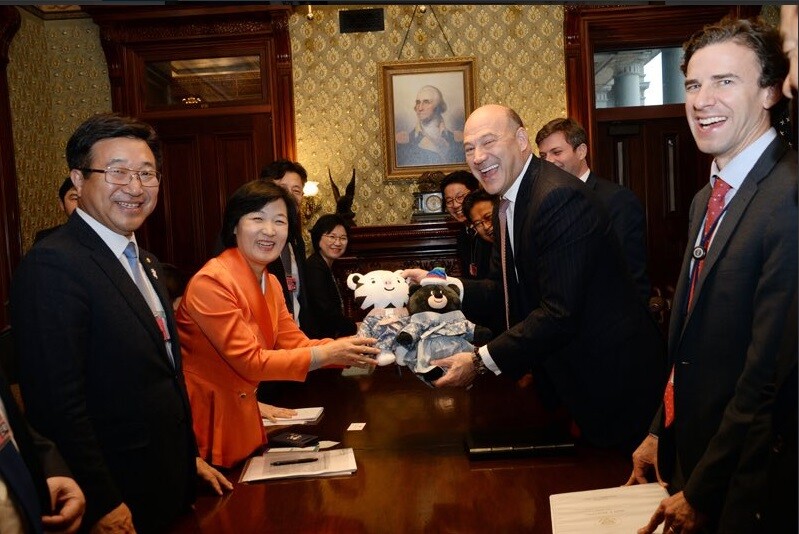hankyoreh
Links to other country sites 다른 나라 사이트 링크
American trade negotiators to seek more US-made parts for imported Korean cars

American negotiators are seen as likely to demand the use of more US-made parts in South Korean automobiles for export to the US in revisions to the South Korea-US Free Trade Agreement (KORUS FTA). According to accounts on Nov. 19 from members of a delegation visiting the US with Democratic Party lawmaker Choo Mi-ae, the Trump administration wants more parts procured within US territory for South Korean automakers’ local factories in the US and South Korea production factories. In a Nov. 15 talk with reporters in the US, Choo also shared details from a meeting with White House National Economic Council Director Gary Cohn.
“They [the US] are making unreasonable demands that we procure automobile parts within the US,” she said at the time.
While the KORUS FTA and other FTAs do include regional value content (RVC) ratio requirements mandating procurement of some components of finished cars in the partner country for customs-free exportation between parties, the demand for procurement in one specific partner country is seen as unusual. In its negotiations to amend the North American Free Trade Agreement (NAFTA), the US imposed a number of conditions for the customs-free importation of Mexican- and Canadian-made cars in the US, including 85% or more parts produced in the three countries and the institution of new provisions for procurement of at least 50% US-made parts. Many predict it will call for instituting similar provisions with the KORUS FTA.
According to a US National Highway Traffic Safety Administration report, Hyundai Motors uses only 0–3% US-made parts for models exported from South Korea. It procures a high percentage of US parts (26–51%) only for models made at its local US factories. The addition of a new provision for procurement of US parts would require Hyundai-Kia to import more of the parts for customs-free exports – which stands to negatively impact sales for the domestic companies that currently supply them. Automobile parts rank after automobiles as one of the largest categories for US export (US$6.75 billion in 2016, or 10.2% of total annual exports to the US). Most are supplied to Hyundai-Kia’s local factories in the US.
By Cho Kye-wan, staff reporter
Please direct questions or comments to [english@hani.co.kr]Please direct questions or comments to [english@hani.co.kr]

Editorial・opinion
![[Editorial] Penalties for airing allegations against Korea’s first lady endanger free press [Editorial] Penalties for airing allegations against Korea’s first lady endanger free press](https://flexible.img.hani.co.kr/flexible/normal/500/300/imgdb/original/2024/0502/1817146398095106.jpg) [Editorial] Penalties for airing allegations against Korea’s first lady endanger free press
[Editorial] Penalties for airing allegations against Korea’s first lady endanger free press![[Editorial] Yoon must halt procurement of SM-3 interceptor missiles [Editorial] Yoon must halt procurement of SM-3 interceptor missiles](https://flexible.img.hani.co.kr/flexible/normal/500/300/imgdb/child/2024/0501/17145495551605_1717145495195344.jpg) [Editorial] Yoon must halt procurement of SM-3 interceptor missiles
[Editorial] Yoon must halt procurement of SM-3 interceptor missiles- [Guest essay] Maybe Korea’s rapid population decline is an opportunity, not a crisis
- [Column] Can Yoon steer diplomacy with Russia, China back on track?
- [Column] Season 2 of special prosecutor probe may be coming to Korea soon
- [Column] Park Geun-hye déjà vu in Yoon Suk-yeol
- [Editorial] New weight of N. Korea’s nuclear threats makes dialogue all the more urgent
- [Guest essay] The real reason Korea’s new right wants to dub Rhee a founding father
- [Column] ‘Choson’: Is it time we start referring to N. Korea in its own terms?
- [Editorial] Japan’s rewriting of history with Korea has gone too far
Most viewed articles
- 1Months and months of overdue wages are pushing migrant workers in Korea into debt
- 2[Editorial] Penalties for airing allegations against Korea’s first lady endanger free press
- 3Bills for Itaewon crush inquiry, special counsel probe into Marine’s death pass National Assembly
- 4Trump asks why US would defend Korea, hints at hiking Seoul’s defense cost burden
- 560% of young Koreans see no need to have kids after marriage
- 6S. Korea discusses participation in defense development with AUKUS alliance
- 7[Reporter’s notebook] In Min’s world, she’s the artist — and NewJeans is her art
- 8Korean firms cut costs, work overtime amid global economic uncertainties
- 91 in 3 S. Korean security experts support nuclear armament, CSIS finds
- 10[Guest essay] Maybe Korea’s rapid population decline is an opportunity, not a crisis